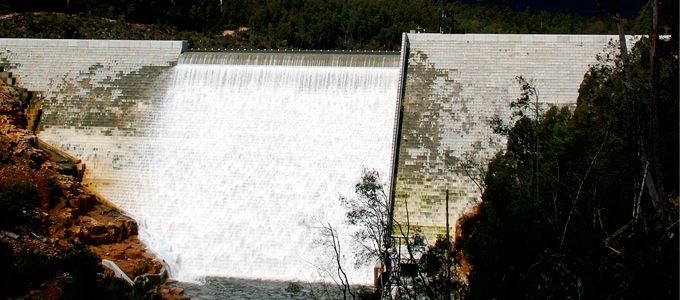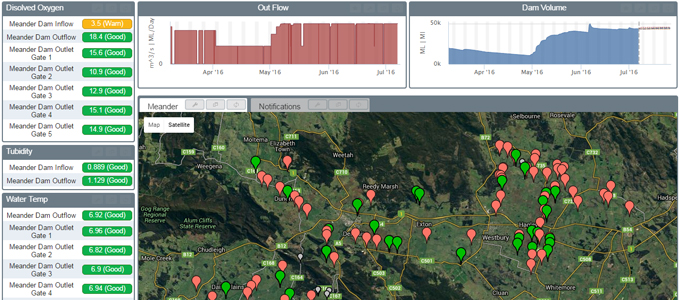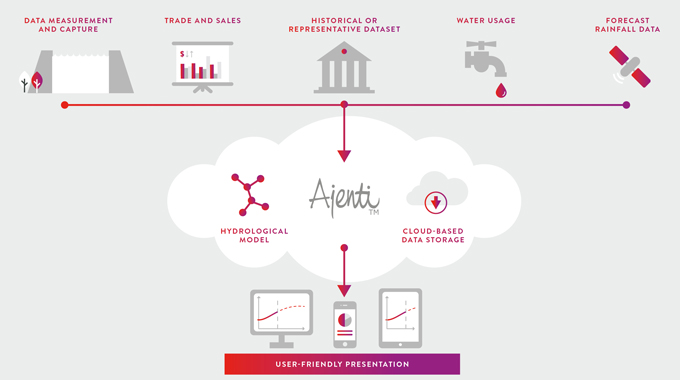THOUGHT LEADERSHIP
Maximising irrigation certainty and security with the right data
Perhaps the greatest gift to any agricultural region is increased certainty of reliable, available water.
Agricultural communities thrive when they can depend on irrigation. Confidence in a reliable supply of irrigation water is critical for increasing agricultural productivity, diversifying businesses, creating new opportunities for investment, and strengthening rural and regional communities.

To be successful, an irrigation scheme must deliver adequate and secure water to users when required. In an increasingly volatile climate, secure water supplies can only be guaranteed through careful management and through well-informed planning and decision-making.
But how can irrigation managers decrease the risks to their storages and supply systems, and increase the effectiveness of their plans and decisions?
The answer lies in the quality of the data and analysis on which their decision-making depends. Irrigation storages and systems are huge investments, and getting the best out of them should also involve some targeted investment in a state-of-the-art data management and decision-support system.
The key components of a water management system
Water managers considering implementing a water management system should look for the following key components and features:
- accurate measurement and data capture from well-maintained field sensors and telemetry
(including automated quality checking to detect major data errors or missing data) - historical data, or a representative dataset, that shows inflow patterns and generates stochastic inflow data
- an optimal hydrological model of the catchment and storage that models inflows and water levels and how the storage varies (models should be reviewed periodically with the most recent data to ensure that the parameters are still optimal and that forecasts are performing as expected)
- forecast rainfall data for the short term, directly incorporated into the system from the relevant meteorological forecasting agency
- user-friendly customisable dashboards or apps that allow rapid oversight and interpretation of the state of the system and short-term forecasts
- cloud-based storage of information in a robust database, providing a reliable, fully hosted and maintained service, continuously operated and improved by experts, without the need to invest in hardware or directly employ specialist technical expertise.
In combination, these features provide the foundations for a successful water management system, and a worthy investment in water security, providing resilience to climate variability and shifts.
An award-winning integrated water management system in operation
Tasmanian Irrigation engaged Entura to design, develop and deliver an integrated water management system for Meander Dam in northern Tasmania. This dam provides irrigation water to an agricultural area with further development potential, regulates seasonal environmental flows, and also generates hydropower to help offset operational costs.

Entura’s water management system delivers a full picture of the dam’s current status and possible short- and long-term water storage and power output scenarios, providing reliable information to help deliver irrigation certainty while maximising hydropower generation and ensuring dam safety.
The system harnesses real-time rainfall and flow monitoring data captured by a network of catchment telemetry. This information is combined with a hydrological model of the catchment and weather forecasts from the Bureau of Meteorology to produce short-term (7 day) and long-term (up to a year) forecasts and simulations, showing a range of possible scenarios and probabilities for water storage and power output.
These forecasts and simulations offer the necessary insights to understand the immediate and longer term implications of management actions, and to make operational decisions based on different risk profiles.
The dam’s current status and possible future scenarios are presented via a user-friendly dashboard interface. The data can be delivered in whatever format or platform the client desires, and is able to integrate with other applications or have other features added to it.
Real-time information from water meters on pumps within the irrigation area is also brought into the system to give the operator a complete water balance in the area fed by the dam.

Because Entura’s solution is cloud based, it is robust, ensures continuous effective operation and maintenance, and allows very high reliability (99.995% uptime) to be achieved for reasonable cost.
Entura backs-up the system with 24/7 expert support to keep it performing at an optimal level. This is a cost-effective and secure way for an irrigator to access the expertise behind a specialist best-practice system, avoiding the need to purchase and maintain expensive hardware, reducing the requirement for any specialist technical capacity on staff, and eliminating the risk of system error or outage.
Benefits of the water management system
Certainty of water supply
In the region dependent on Meander Dam, Entura’s system contributes to Tasmanian Irrigation’s ability to deliver certainty of water supply, which is crucial for increasing agricultural output and productivity and maintaining resilience. Water security delivers greater confidence for investment in these individual farms and high-value crops, but also increases the confidence and development of the region as a whole, strengthening the community through increased employment and economic activity.
In the 2015–16 irrigation season the region experienced below-average rainfall that resulted in reduced inflows into Meander Dam and increased demand for water supply to irrigators. With the aid of the integrated water management system, Tasmanian Irrigation was able to match demand from predicted storage levels, fulfilling irrigator expectations and retaining sufficient storage capacity to be able to extend water delivery for an additional month. This ensured that irrigators were able to finish final crops and also maintain pasture growth for livestock and dairy activities.
Maximum hydropower generation
The water management system also allows optimisation of the dam operating rules to get the most out of the dam’s integrated hydropower facility, while still maintaining security of irrigation supply. The system enabled Tasmanian Irrigation to maximise hydropower generation after the end of the 2015–16 irrigation season, as the predicted rainfall allowed increased generation which also minimised the potential for the dam to spill.
Dam safety in severe weather
A further benefit of the system is improved decision-making regarding water resources and dam management during severe weather. This offers direct benefit to the health and safety of the local community, the local environment and the productivity of the local economy through reducing drought-related costs and impacts (e.g. loss of farm productivity, mental health impacts, maintenance of minimum environmental flows) and mitigating flood risks and impacts (e.g. maintaining dam safety, minimising spill, and managing downstream safety and environmental impacts).
The Meander Dam integrated water management system was the winner of the Australian Engineering Excellence Awards Tasmania 2016 in the category ‘Control Systems, Networks, Information Processing and Telecommunications’.
Entura has extensive experience supporting water managers to make the best use of their storages for multiple water uses (whether for hydropower, irrigation, environmental flows, or domestic or industrial purposes), and in creating innovative decision-support systems to manage water risks through reliable and accessible data.
To discuss how Entura can support you to increase the efficiency and security of your water storages through the right operational decisions, please contact Phillip Ellerton on +61 439 010 172.
MORE THOUGHT LEADERSHIP ARTICLES
12 September, 2016







